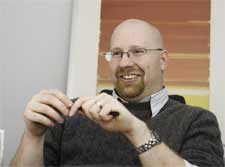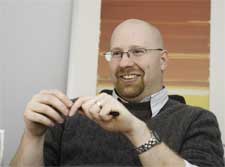 KINGSTON, R.I. –March 18, 2009–University of Rhode Island chemist Brenton DeBoef’s office bubbles with enthusiasm. Students are encouraged to come in and out with thoughts of how to make drugs and other chemical products more efficiently. “We’re inventors here,” says the East Providence resident with a smile that not only fills his face but lights the room. “We invent new chemical reactions.”
KINGSTON, R.I. –March 18, 2009–University of Rhode Island chemist Brenton DeBoef’s office bubbles with enthusiasm. Students are encouraged to come in and out with thoughts of how to make drugs and other chemical products more efficiently. “We’re inventors here,” says the East Providence resident with a smile that not only fills his face but lights the room. “We invent new chemical reactions.”
DeBoef knows what he’s talking about. His newly patented chemical process eliminates the need for chemicals that contain certain atoms, such as bromine and boron that are often required to link the two molecules together. Instead, his invention of a new chemical reaction, then, cleaves strong carbon-hydrogen bonds and forms new carbon-carbon bonds in a single step.
Why is this important? The answer is three-fold: DeBoef’s novel process saves time, money, and the environment. Making molecules is akin to constructing a building, a multiple step process. It is considered a very inefficient, lengthy, and expensive process. DeBoef’s process is attractive to industry because of its time saving element. And in industry, time means money. And the process bypasses the need for the bromine and boron, which are discarded as chemical waste. DeBoef and his invention are part of the growing global green chemistry movement, which encourages the design of products and processes that reduce or eliminate the use of hazardous materials at its source.
Pharmaceutical companies have already knocked on the URI chemist’s doors. DeBoef says his work is fundamental science that can be useful and applied to different industries. For instance, his process could also help streamline the synthesis of high-value molecules for pharmaceuticals, herbicides, and dyes.
DeBoef says that more needs to be developed and expanded before the process reaches the marketplace. Impressed with his work and his proposal, the National Science Foundation recently awarded DeBoef a five-year $550,000 Faculty Early Development grant to do that development.
“Dr. DeBoef is an outstanding teacher and scientist whose entrepreneurial research in green chemistry is applicable to a variety of products and processes,” notes Winifred Brownell, dean of the College of Arts and Sciences. “Undergraduate and graduate students eagerly flock to his laboratory and classes, and companies do as well. We are all delighted to see his groundbreaking research recognized with this prestigious award from NSF and are confident that Professor DeBoef will continue his phenomenal achievements in green chemistry that will improve both production and the quality of life in Rhode Island and throughout the world.”
The grant will also help DeBoef develop a new green chemistry curriculum so that students will be trained as synthetic chemists for the global marketplace. The grant provides funding for five graduate students and three to four undergraduates. DeBoef is also developing an International Chemistry Program that will partner with Technische Universität Braunschweig, Germany. DeBoef recently visited the German university with John Grandin who founded URI’s popular and widely respected International Engineering Program. One of DeBoef’s graduate students, Shathaverdhan Potavathri, earned a master’s degree at Braunschweig. There he met enthusiastic URI engineering students who convinced him that URI was the place to study for his doctorate.
A woman comes into DeBoef’s office in Pastore Hall with her notes and presents her hypothesis to her professor. “How imaginative!” he says with another of his huge smiles. “I’ll give you high points for that.” The student asks if she is correct in her chemical assumptions. Well no, the professor says, explaining why her proposed process wouldn’t work. “But that’s okay,” he reassures her. “I can see that you’re thinking.”
URI Department of Communications & Marketing photo by Michael Salerno Photography.

